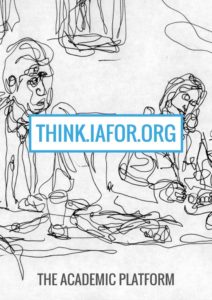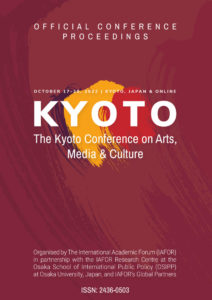Conference Proceedings
If your submission has been accepted, and you presented the work at KAMC (including Virtual Presentations), you are encouraged to submit a full paper via the online submission system for inclusion in the Conference Proceedings, which will be made available online. For further details of how to submit your paper, please view the Final Paper Submission page. IAFOR Conference Proceedings are Open Access research repositories that act as permanent records of the research generated by IAFOR conferences.
Please note that:
- works published in the Conference Proceedings cannot be considered for publication in IAFOR journals.
- IAFOR's Conference Proceedings are not peer-reviewed and are not "Scopus-indexed".
IAFOR Journal of Cultural Studies (Scopus Indexed Journal)
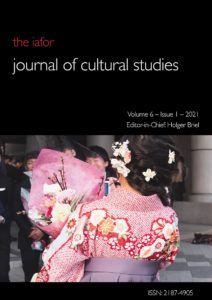 The IAFOR Journal of Cultural Studies solicits scholarship in the broad areas of culture, social development, the arts, digital communities, philosophy and similar.
The IAFOR Journal of Cultural Studies solicits scholarship in the broad areas of culture, social development, the arts, digital communities, philosophy and similar.
While much of the journal's focus rests on Asia, it encourages contributions from all across the globe, thereby establishing links between intercultural and transcultural phenomena and analysing them. Asia is a continent constantly evolving within a restive world and it is the aim of this journal to provide challenging and incisive commentary to accompany this process.
We envisage the IAFOR Journal of Cultural Studies to be an open space for developing topics, threads and nodes of cultural understanding. The journal recognises that cultural studies is necessarily hybrid in nature and that even the establishment of common research fields (itself a highly contested exercise) will do little to discipline it. This, however, does not relieve cultural studies of the necessary reflection upon its own histories and present status quo. It is hoped that some of these discussions will take place in the virtual pages of this journal and that those theoretical interventions stimulate and interact with further research. As cultures are becoming increasingly mediated, ample space will be provided for those interventions highlighting the relationship between (media) technology and culture.
The journal Editor welcomes submissions related to cultural studies from academics, practitioners and professionals within the field. The articles are submitted through the submission portal and must conform to the journal Author guidelines. All papers are reviewed equally according to standard peer review processes, regardless of whether or not the authors have attended a related IAFOR conference.
Please note that papers already submitted to or published in IAFOR Conference Proceedings are not accepted for publication in any of IAFOR’s journals.
Indexed in: Scopus (from October 2022), DOAJ, MIAR, TROVE, Scilit, SHERPA/RoMEO, Mir@bel, Dimensions, LENS.ORG and Google Scholar. DOIs are assigned to each published issue and article via Crossref.
IAFOR Journal of Arts & Humanities
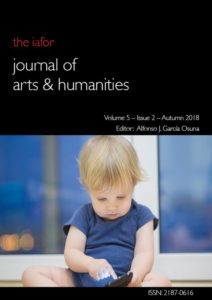
The editorial team aim to bring meaningful, influential work to an international community of scholars as well as to a worldwide audience. As such, we only publish papers with substantial scholarly underpinnings that will appeal to specialists and non-specialists alike and will advance our understanding of the arts and humanities. Given the journal’s wide scope, the research submitted must rise above the limitations of narrow, confined case studies. Where such studies are submitted, they must offer insights into issues of general interest to scholars.
The journal Editor welcomes submissions related to the arts and humanities from academics, practitioners and professionals from within the field.
Please note that papers already submitted to or published in IAFOR Conference Proceedings are not accepted for publication in any of IAFOR’s journals.
Indexed in: DOAJ, MIAR, Google Scholar, SHERPA/RoMEO, TROVE and Humanities Source. DOIs are assigned to each published issue and article via Crossref.
IAFOR Journal of Education (Scopus Indexed Journal)
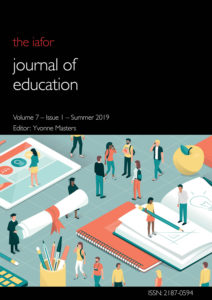
The IAFOR Journal of Education is an Open Access, peer-reviewed, international and intercultural journal. The journal encourages interdisciplinary research, with the primary focus being on addressing critical issues and current trends and research in education. Papers submitted by academic researchers, theorists, practising teachers, policy-makers and educational administrators are welcomed. All papers published in the journal have been subjected to the rigorous and accepted processes of academic peer review. Submissions should be original, previously unpublished papers which are not under consideration for publication in any other journal. All articles are submitted through the submission portal on the journal website and must conform to the journal submission guidelines.
IAFOR believes in “Open Access” publishing, and since 2009, has been committed to maintaining an online searchable research archive that offers free access to anyone, anywhere, where there is Internet access, regardless of institutional affiliation or scholarly rank. IAFOR publications are accessible on the website (Open Access) to researchers all over the world, completely free of charge and without delay or embargo. Authors and contributors are not required to pay charges of any sort towards the publication of IAFOR journals.
Indexed in: Scopus, DOAJ, ERIC, EBSCO Discovery Service, Education Source, MIAR, TROVE, SHERPA/RoMEO and Google Scholar. DOIs are assigned to each published issue and article via Crossref.
DOI Registration
 All papers published in IAFOR Journals and IAFOR Conference Proceedings are assigned a DOI (Digital Object Identifier) via Crossref. This enables published articles to be cited properly and increases their visibility.
All papers published in IAFOR Journals and IAFOR Conference Proceedings are assigned a DOI (Digital Object Identifier) via Crossref. This enables published articles to be cited properly and increases their visibility.
THINK
